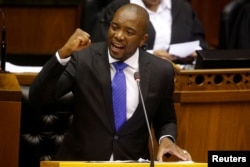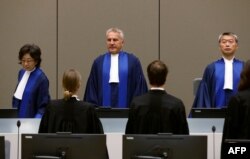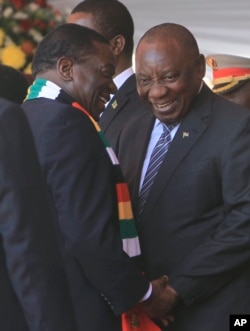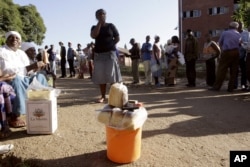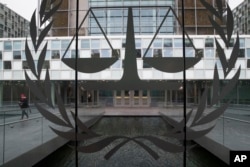The opposition Democratic Alliance (DA) of South Africa says it is taking Zimbabwe’s human rights violations to the International Criminal Court (ICC), United Nations High Commission for Refugees and parliament in an attempt to stop alleged atrocities being committed by the Zimbabwe Defence Forces and other state security agents that have launched a crackdown on people suspected to have been involved in protests two weeks ago over the high cost of living.
In a statement, DA leader Mmusi Maimane, who described the situation in Zimbabwe as a humanitarian crisis, said indications are that one day in mid-January, at least 130,000 people arrived in South Africa from Zimbabwe showing signs of distress and claiming that their lives were in danger back home.
Maimane said despite the humanitarian crisis, President Cyril Ramaphosa’s African National Congress (ANC) government “has sat on its hands and watched on, employing its ‘quiet diplomacy’ policy’.”
The DA leader said his party will stand with the people of Zimbabwe and fight against “the oppression and murder of innocent Zimbabweans who are mobilising and calling for change. You have many friends in South Africa. Beyond your borders you have millions of allies in your fight for a free and open society … The DA will pursue a set of immediate interventions to resolve the current crisis occurring in Zimbabwe. The injustice that is occurring in Zimbabwe cannot be ignored.
“Firstly, in my capacity as Chairperson of the Southern African Partnership for Democratic Change (SAPDC), I will pay a working visit to Zimbabwe this week. I will meet with current opposition leader, Nelson Chamisa, and former MDC leader, Tendai Biti, among others. The purpose of this visit is to seek practical solutions to the ongoing crisis, and garner support across the region for much-needed intervention in Zimbabwe.”
Maimane said his party is in the process of writing to the prosecutor of the ICC to request an investigation into the conduct of the Government of the Republic of Zimbabwe as per Article 15 of the Rome Statute.
“The ICC’s Office of the Prosecutor is empowered by the Rome Statute to ‘… determine whether there is sufficient evidence of crimes of sufficient gravity falling within the ICC’s jurisdiction, whether there are genuine national proceedings, and whether opening an investigation would serve the interests of justice and of the victims’ …”
He said his party will also formally approach the United Nations (UN) Commissioner on Human Rights requesting the intervention of the United Nations Human Rights Council in the ongoing crisis in Zimbabwe in accordance with its mandate to protect human rights around the world.
Maimane said the DA wants the political crisis in Zimbabwe to be debated in South Africa with the party urgently requesting a joint meeting of the South African Parliament’s portfolio committees on Home Affairs, International Relations and Cooperation, Police, and Defence and Military Veterans to deliberate on the political and humanitarian crisis in Zimbabwe.
“(I will) … Request the National Assembly to urgently debate the impact of the violence by Zimbabwean government on South Africa. It is vital that Parliament considers, debates and deliberates on this matter, and seeks collective solutions in light of the President’s failure to act.”
Maimanie said some Zimbabweans have been shot and killed, homes have been raided and the entire country is effectively on lockdown.
“According to the Zimbabwe Human Rights NGO Forum, at least 12 people have been killed, 78 shot at, and 240 faced what the NGO has termed ‘assault, torture, inhumane and degrading treatment’. And Zimbabweans are fleeing their country, as we are told by border officials that over 130,000 people crossed the Zimbabwean/South African border in a single day in mid-January. The situation in dire.”
He attacked Ramaphosa’s government saying there has been no advocacy for Zimbabwean citizens, no justice for the deceased, and no protection of civil liberties for those who are currently detained.
“For President Ramaphosa and his ANC, maintaining the brotherhood of ‘big man politics’ across the continent is more important than the dignity, livelihood and human rights of fellow human beings. From Zimbabwe, to Zambia, to the Democratic Republic of Congo (DRC) – the ANC has chosen oppressors over the oppressed.
“This is because Ramaphosa and Mnangagwa are cut from the same cloth. And South Africa and Zimbabwe share very similar stories. Within months of each other, both Zimbabwe and South Africa found themselves with new presidents who seemingly offered their countries a clean slate. However, for the people of South Africa – like the people of Zimbabwe – there has been no new beginning. There has been no new dawn. It was simply an act of window dressing designed to keep the power and the patronage in-house. When Robert Mugabe – just like Jacob Zuma – become too toxic for the people to tolerate, they were simply discarded in favour for someone more palatable. But around him nothing else changes. This is not the change the people of both countries desperately need.”
Maimane said there was hope for political and economic change following the removal of long-time Zimbabwean ruler Robert Mugabe from office by the military in conjunction with the ruling party and parliament.
“With the fall of the Mugabe regime, a sense of hope arose as change was promised by new President Emmerson Mnangagwa. Mnangagwa committed to doing things differently, and Zimbabweans believed this was indeed possible. However, over a year after Mnangagwa took office, nothing has changed.
“The frustration and sense of betrayal saw Zimbabweans take to the streets and exercise their democratic right to protest joblessness, poverty, economic distress and exorbitant fuel increases. Unarmed civilians have been met by armed violence by government. And the current crisis has now reached boiling point.”
He said the Zimbabwean humanitarian crisis should be tabled by the United Nations Security Council.
“… Now that South Africa will hold a non-permanent seat on the United Nations Security Council (UNSC) for the term 2019 – 2020, we challenge President Ramaphosa to use our position on the UNSC to advance liberal democracy and stand up for justice, freedom and human rights across the globe. The ANC government’s voting record at the UN tells a worrying story of siding with dictators and thug-governments. This must change.
“Our continent must soon come to the realisation that liberation movements never make good governments. Not here in Zimbabwe. Not south of the border in South Africa. And not anywhere on this continent. Africa does not need backward looking leaders or parties that were once glorious. We need people and parties who can imagine Africa’s future and potential. We don’t need politicians who are only in it for themselves – big, self-important men who see government as a way of becoming rich. We need selfless leaders who understand what it means to serve.”
He said there is need for change in Africa “… change that removes corrupt liberation movement governments and ensures that the 21st Century is the century in which Africa gains its true freedom.”
Presidential spokesperson George Charamba and representatives of the ANC and President Ramaphosa were not reachable for comment.






